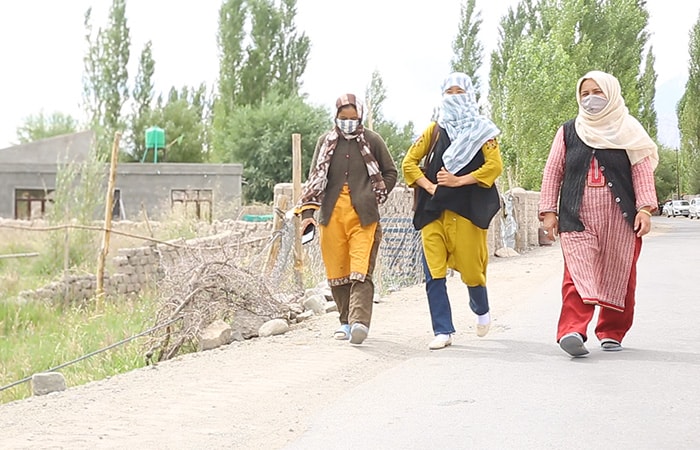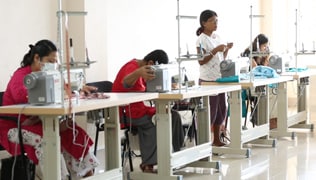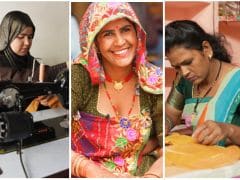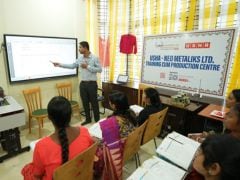USHA Silai School Collaborates With Institutions That Promote Sustainability
In 2011, USHA Silai School began with the aim of empowering rural women to become entrepreneurs and give sewing lessons in their respective communities. But over the years, the Silai School initiative has evolved and today it is not only limited to giving sewing lessons and a silai machine to women to open their own silai school, but also works towards contributing its bit in the conservation of the environment by promoting sustainability. In this season of Kushalta Ke Kadam, the USHA Silai School initiative joined hands with organisations in Ladakh and Maharashtra that work towards protecting environment and supporting local people.

Zara Bano, a resident of Chuchot Bangapa Leh, is one of the women artisans who produce some of the finest Pashmina in the world but did not have access to right market to sell her handmade products. After she got to know about USHA Silai School programme from Looms of Ladakh, Zara enrolled herself for a 10 days training and has now opened her own Silai School and is looking forward to selling finished garments made by her.

Phunchuk Dolma is another beneficiary of USHA's training programme in Ladakh. She used to earn Rs. 7,000 per month on an average by the weaving of wool and pashmina. But after getting trained in stitching at USHA Silai School, Ms Dolma is expecting to earn more as she is now able to produce finished products herself and does not require another tailor to that job for her. Even after being a senior citizen, her enthusiasm towards sewing has given her a chance to become a trainer at USHA Silai school at this age.

According to Rigzin Yangdol, CEO, Looms of Ladakh, it is difficult for the local people to buy the products handmade by women because the prices are high. Therefore, the sale of authentic Pashminas and other handmade garments depends on tourists visiting the place. She said that along with helping women have a sustainable livelihood and access to new markets, the initiative has helped in building their skills in various techniques for stitching and machine repairing.

Continuing its work towards sustainability, USHA partnered with The Corbett Foundation (TCF) in Maharashtra where it provided skill development training to women from tribal communities living in villages near forests in Thane. The aim is to help the communities that are largely dominated by tribal population that are dependent on forests for food, fuel and livelihood to engage in alternate activities for earning income and reduce the pressure on already depleting forests.

Bharti Kaislash Jadhav, a 30-year-old woman is a beneficiary of USHA-TCF collaboration. She and her family were facing financial struggles and putting food on the table every day became a challenge for them. But a sewing machine has made a difference to her life. She is able to earn Rs. 4,000 every month working from home now out of which she saves Rs. 1,000 per month. While talking to NDTV she said, 'There is a lot of poverty in my village. We could not even take care of our kids as we were out the whole day for work. But with help of USHA Silai School, I am able to earn from home itself. I am able to stitch a lot of things and I also know machine repair work now. This has helped me and my husband a lot and we are now able to get some important renovations done for our house.'

With an aim to take the message of sustainability to a larger scale, USHA has collaborated with UNFPA (United Nations Population Fund). Under the partnership, 100 women will be trained to become master trainers who will in turn train 3,000 women across India in life skills over the next three years to help them become successful entrepreneurs and ear a better income.
Adopt a Silai School
About the Initiative
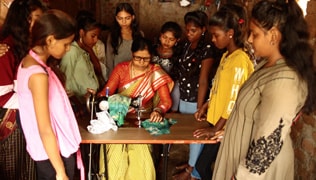
Kushalta Ke Kadam, an initiative by USHA Silai School and NDTV has entered its eighth season. The aim is to empower more women across rural India by teaching them sewing skills and helping them open new doors of opportunities for themselves. The initiative encourages rural women to become financially independent and entrepreneurs by taking up sewing and training others in their respective communities.
Since 2011, the USHA Silai School initiative has trained more than 12 lakh rural women through over 33,000 Silai schools, spanning over 20,751 villages across India.
The women earn Rs. 4,000 – 5,000 per month on an average, with the highest recorded monthly earning being Rs. 84,000 in a month. This earning works as a catalyst towards building their self-confidence, reducing gender inequities, and raising their stature within their families and in society at large.
Latest Stories
- Team NDTV | Monday February 16, 2026
Odisha's Suchismita Sahu, Rajasthan's Preeti Prajapat, Manipur's Akhirun—Usha Silai School's Kushalta Ke Kadam celebrates these awardees, from homemakers to master trainers earning accolades
- Team NDTV | Thursday February 12, 2026
From Ladakh peaks to Assam fringes, Usha Silai School trains tribal women in Turtuk, Kargil & Dakhinkuchi—crafting livelihoods with armed forces, NHPC & NGOs. Stitching national resilience
- Team NDTV | Thursday January 29, 2026
From West Bengal's transgender tailors to Telangana's tribal seamstresses and Meghalaya's embroidery revivalists, Usha Silai School's Kushalta Ke Kadam partners with NIRDPR and state governments
- Team NDTV | Tuesday February 03, 2026
In Odisha's mining heartlands, Mahanadi Coalfields Limited teams with Usha Silai School's Kushalta Ke Kadam and Gram Utthan, empowering tribal women turning them into entrepreneurs
- Written by Team NDTV | Friday January 02, 2026
Usha Silai Schools give second chances to women like Srinagar's Marifat, who rebuilt after widowhood; Madhya Pradesh's Jyoti, escaping abuse to run her own center; and Rajasthan's Vimla, rising from child marriage to tailor and teacher. Through nine-day training, they gain sewing skills, confidence, and income proving one stitch mends lives and inspires communities.
- Team NDTV | Friday December 26, 2025
A new wave of corporate-community partnerships is equipping rural women with skills, income and confidence

